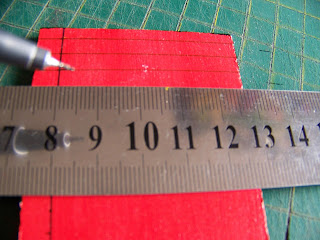I start by collecting a number of elements that appeal to me. These will not all make it into the final project, but they will serve as a starting block to spark an idea. I have a range of fabric off-cuts, zipper off-cuts, buttons and covered buttons (learn how to cover buttons here). I also have a small piece of off-cut wood left over from a previous blog. All of this will be put together on a sheet of paper that I have strengthened with Gesso beforehand (read about that here). I also have fabric and paper scissors at hand as well as the trusted metal ruler.
I pick a selection of fabric pieces that compliment each other. In this selection the common factor is the turquoise colour which happens in each piece of fabric. I lay the off-cut pieces loosely on the strengthened paper to make sure it covers the page completely.
There is more than one way to attach fabric to paper. In a previous blog I have shown you how to fuse it to the paper with melted plastic. Read that blog here. Today we will be using Acrylic Gel Medium to decoupage it to the paper, though. You will need Acrylic Gel Medium, a flat brush and water to rinse the brush in when you are done.
Cover the area where the first piece of fabric will go with Acrylic Gel Medium.
Lay the fabric over the painted paper and smooth it out so there are no wrinkles. Now brush the Acrylic Gel Medium over the fabric.
Prepare the next section of paper with the Acrylic Gel Medium, lay the fabric in place, smooth out and brush over with another layer of Acrylic Gel Medium.
Repeat the same steps with the third piece of fabric. In my case this fabric was much thicker than the polycottons used at the top and required substantially more Acrylic Gel Medium to adhere to the page. This will also prolong the drying time.
Leave the layout to dry thoroughly before you continue. The drying time will be shorter on warmer and drier days than on humid or cold days. As the paper dries, you will see the corners curl up to the point of desperation. This is natural. Leave it be. It will straighten out beautifully once dry and lie back down all on its own.
While waiting for the decoupaged paper to dry, I continue with the preparations of another element; the small wooden off-cut I intend to use in the layout. I enjoy the spontaneity of the red in the owl print fabric and choose to lift this colour out by painting the piece of wood red. I paint the edges black. I once again use a flat brush and Acrylic Paint.
The day on which I did this was a wet and cold day and when I turned the paper over to crop the fabric, I found that the paper needed to dry some more. Those bubbles you see in the photo are all gone once the project is dry. Anyway, once the project has dried, turn it over and trim the fabric to fit the paper properly, cutting away the excess.
It is time to plan how to arrange the remaining elements. I added a small piece of lace I had on hand to my collection.
I use my trusted Tombow Glue to stick all of the fabric pieces to the background. This is so that they remain correctly aligned when I sew them in the next step.
Only the lace and zipper off-cuts are glued down. I wait for the glue to dry before continuing.
I decide to use vibrant red in my choice of thread and set my machine to a long stitch length. This is very important. If your stitch length is short, it will perforate the paper, weakening it and creating a tear line.
I sew along the top edge of the lace.
I then sew down both sides of the first zipper off-cut.
The second zipper off-cut receives the same treatment.
Can you see how the red thread becomes another design element on the page?
I want to use the covered buttons from a previous blog on the page, but need to get rid of the stems on the back of the buttons so they will lie fat on the paper. I use a hammer to knock the stems flat. Be gentle, you don't want to squash the whole button.
Tombow Glue is brilliant for sticking 3D objects to a layout.
Time to pay some closer attention to the wooden element. I decide it lacks detail. My idea all along has been to include this a journaling space. I realize that the intent is not clear. I decide to use a fine grey marker to draw lines on the wood.
I start by ruling a margin on the side. I then mark equal spaces 0,5 cm apart before drawing the lines on the marks.
Turning the brilliant red element on the page slightly skew, breaks the monotony of the page. I once again use Tombow Glue as adhesive.
The final product. Nice!
Another suggestion for these home-made paper designs, is to scan them into digital format on an A3 scanner. You can then print them out on an A3 printer and use the same design as often as you have need for it.
For more crafty ideas and great products, visit APrettyTalent.com.
Remember to keep nurturing your TALENT for making PRETTY things.
You can subscribe to this blog and receive regular updates by email by simply registering your email address at the top of the current blog.


































No comments:
Post a Comment